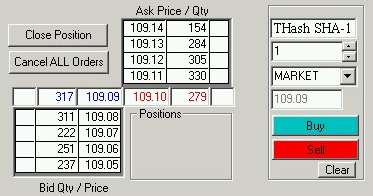Computing Exchange

As you know, competition is the engine of development of any industry, ensuring the most efficient allocation of resources. The perfect competition in the modern world has been preserved, perhaps, only in one place - on the stock exchanges.
About what the exchange is and how it differs from the ordinary market, much has been said on Habré. Read, for example, a series of IPO articles for dummies . I will only note that on the stock exchange there is a trade in standardized goods, buyers and sellers compete only in price.
')
Anything can be a commodity on the exchange: grain, metals, currency, securities, etc. In the form of an exchange, as the most fair and convenient, they trade in seo-links, banner displays, e-currency. So why not trade in what lies at the heart of the IT industry - computing resources.
What will be taken for a unit of goods? There are several possible options. This can be a single floating point operation (1 FLOP). Then the process of selling computing resources will look like this: the vendor provides the client with a certain virtual runtime environment in which a certain amount of memory is available, the processor core, and possibly the video card resources. At the same time there is an interface through which the source data is loaded and the results of calculations are returned. Calculations can go on any algorithm, written in the form of assembler commands. Another option involves a larger unit of trade, for example, 1 Hash. That is, the algorithm by which the hash will be considered is rigidly specified in the software of the exchange's clients. Only the data for the calculations and the results change. This does not mean that the client will have to transfer a huge amount of information. After all, 1 lot on the exchange can be equal to 1 Mhash, the source data is transmitted as a range of values, and the result indicates whether a certain sample string was found among the calculated hashes. This is enough, for example, for the implementation of mining of those same Bitcoins.
Here the question arises: what will the competition of the computer network constructed in this way and, for example, the Bitcoin network, lead to? The answer may be this: a broader concept does not contradict a narrower one, but includes it, takes into account as a special case. Thus, if the course in the global computer network is low, which will make it possible to profitably mine Bitcoins, there will be several equilibrium effects at once. First, the growth in demand for computing in the global computer network will lead to an increase in the rate, secondly, an increase in the supply of Bitcoins will lead to a fall in the value of coins, and, third, the purely technical mechanism provided by the Bitcoin network will work - the network complexity will increase and mining will require more computing resources. And what if the course in the global computer network is such that mining Bitcoins will not be profitable? This will mean only one thing: new, more interesting projects have appeared, and everyone has switched their resources to them. The same applies to the existing AWS, which, unlike the proposed model, is a simple auction in which only buyers compete, and only Amazon is the seller.
Thus, the economically proposed system is quite stable and dynamic. However, there may be two more problems that are socio-ethical in nature.
The first is that the created system can be used by attackers for selecting passwords, RSA keys, etc. But world practice shows that the existence of only the possibility of an unauthorized use of any system cannot be a reason for refusing to develop it. After all, there are hosting sites on the Internet, dedicated servers, etc. Their administrators control the use of their resources. And the proposed distributed computer network just does not claim to absolute decentralization and anonymity. The exchange is an intermediary in the execution of transactions and can verify the integrity of the participants.
The second ethical problem is that material gain can entice those who participated in free distributed computing projects, such as Folding @ home, BOINC, SETI @ home, etc. But, on the other hand, some of these projects have questionable benefits. At the same time, there are many examples in history when purely commercial projects further benefited society.
As we see, the idea of creating an exchange of computing resources lies on the surface. Its technical implementation is possible, as evidenced by the existing open (and underground) projects. I hope that soon we will have the opportunity to share the resources of our computer for the benefit of society and for ourselves.
Source: https://habr.com/ru/post/173297/
All Articles